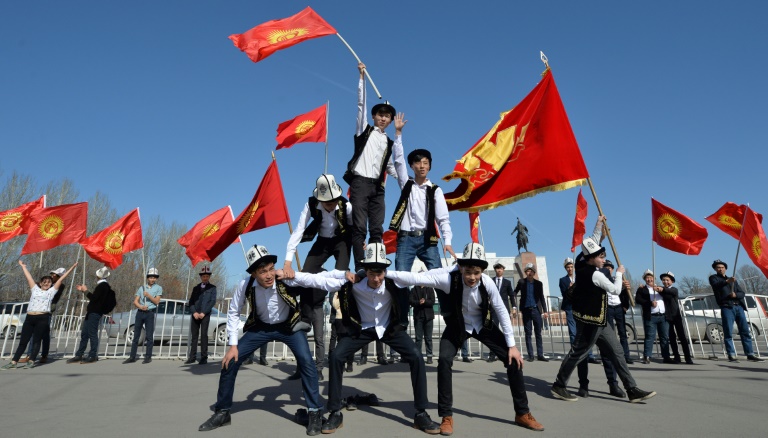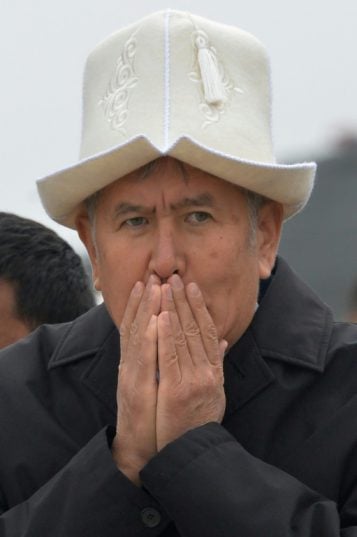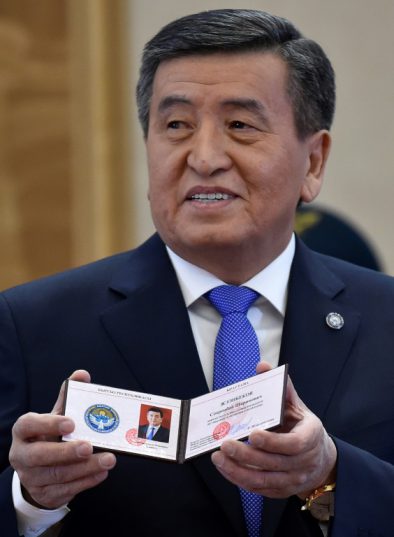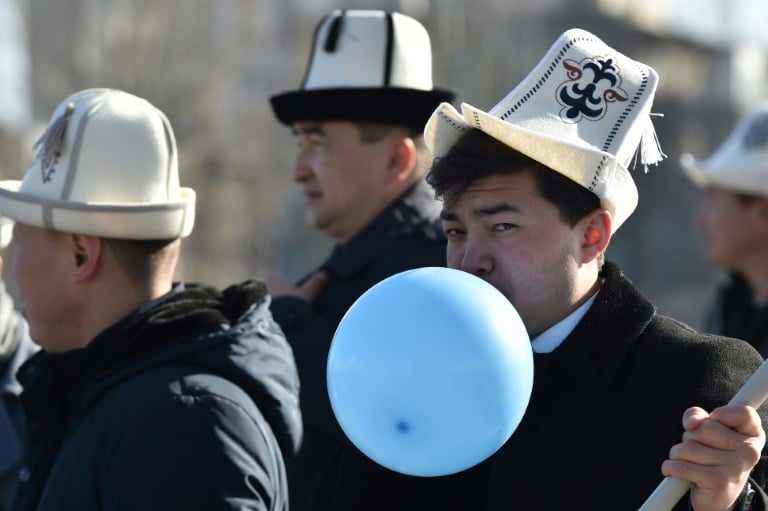Samsung unveils Galaxy A55 and A35 mid-rangers
“It is such a simple hat and yet so great,” he told AFP. “It protects you from both the sun and the cold.”
The four-paneled headpiece, that is usually white, symbolises “the peaks of the magnificent Kyrgyz mountains, forever snow-capped” according to Turgunaliyev.
Kyrgyz hold the felt hat in such high esteem that the headpiece is honoured with its own national day.

Kyrgyz performers at a rally marking national hat day at the central Ala-Too Square in Bishkek on Monday
On Monday, residents of the capital Bishkek took to the city’s streets for annual festivities with the Tien-Shan mountains, that run across Kyrgyzstan’s border with China, as the backdrop.
But this year the national day of the hat was overshadowed by a scandal which has seen a pair of lawmakers lead a push to criminalise “disrespect” shown towards the traditional headpiece.
In the coming months, the parliament is expected to debate legislation which would also force officials, including the president, to wear the hat for diplomatic occasions.
– Much ado about a dog –
The proposed bill appears directly connected to a furore that erupted in December, when a photograph from a local dog fair showing a canine model sporting the hat appeared online, infuriating some patriots.
Some legislators complained that the cherished hat might soon be worn by circus bears and pigs and called for the dog’s handler — a young woman from an ethnic minority — to be brought to justice.
Daniyar Murzaliyev, a 38-year-old patriot who organised a march through central Bishkek in support of the hat as part of Monday’s festivities, said the law was needed to prevent such incidents “repeating themselves”.
He stressed however he did not think the dog handler had deliberately insulted the hat.
“Of course it was incorrect of this non-Kyrgyz girl to put a kalpak on a dog, but I don’t think she meant to offend,” Murzaliyev told AFP.
– Kyrgyz versus imported –
In its current version the bill would lend the same status to the hat as that enjoyed by the national flag and the national anthem.
The fines for disrespecting the headwear would go up to 10,000 soms, which is almost $150 at current rates.
Officials are also set to make life precarious for hat sellers, who could be prohibited from selling kalpaks imported from neighbouring China or other countries.
One seller, Zeinep Tabaldiyeva, 36, suggested that people who are angered that foreign-made kalpaks are being bought by Kyrgyz are simply misinformed.
“We buy synthetic material in rolls and make the kalpaks ourselves,” the seller, who expects a boom in sales as wedding season approaches, told AFP.
At any rate, these days “there is more demand for the authentic felt product,” she said of the hat which can cost more than $20, some ten times the price of its synthetic equivalent.
– ‘Bans are wrong’ –

Former Kyrgyzstan President Almazbek Atambayev sporting his ak-kalpak in 2010
The initiative to create an unofficial holiday honouring the kalpak came about in 2011, less than a year after a popular uprising ejected authoritarian leader Kurmanbek Bakiyev from power.
The revolt — Kyrgyzstan’s second in the space of five years — fuelled a tide of populism in the second poorest former Soviet republic that gained momentum after inter-ethnic conflict in the south left hundreds dead later the same year.
Kyrgyz President Sooronbai Jeenbekov, 59, has yet to comment on the contentious bill, which would require his signature to become law unless more than two thirds of lawmakers supported it.

Kyrgyz President Sooronbai Jeenbekov is not often seen with his hat since taking office last year
Jeenbekov wore an ak-kalpak regularly on the campaign trail prior to his electoral victory in October last year, but has largely eschewed the hat since taking office.
Turgunaliyev, the former presidential advisor who now heads a national heritage association, said he backed the bill.
“If this parliament — this deeply corrupt organ — can make this one step, it will mean that they have not yet abandoned all their nationhood,” he said.

The fate of the Ak-Kalpak bill is up in the air
Critics like Ainuru Altybayeva, a moderate MP in the ruling party that nominated Jeenbekov, say they are hopeful that the punitive bill would be defeated.
“Pressing people to respect the kalpak via bans is wrong,” said Altybayeva, who also fears that the demand for officials to wear the hats on state visits “might violate international protocols”.
Instead, Altybayeva told AFP, respecting the ak-kalpak should be part of “the upbringing of any child”.